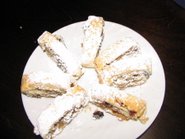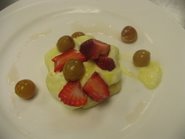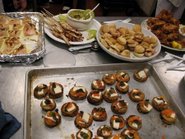1. Mise en Place
As a French speaker, it is an expression that I understood right away. Mise en place means putting everything in place. This is the entire organization of your workplace before starting to cook, including chopping all your ingredients and setting them up in little bowls or neatly organized on a big chopping board. This means to saute or do anything that it says to do in advance. This way when you start cooking your recipe, you do it quickly and effectively and you don't end up burning one thing while looking for another. It's one of those cooking terms that you probably hear all the time on cooking shows but have never really paid attention to.
2. How to Chop
For many this is the most tedious, time consuming task to be done in the kitchen. I used to cut my salad in all different shapes and sizes, which made it not only unsightly but hard to eat. You need to take a class and get a good chef's knife for this(see number 3 for a better explanation). If you are going to invest in any cooking class it should be a knife skills class
because there are certain things you just have to learn hands on. There are also many sites that can help.
Click Here to Learn How to Chop an Onion
Most people hate cutting onions, but learning the onion cutting technique can make chopping them a lot of fun. I have heard from quite a few chefs that chopping onions is their cutting preference.
3. Get a Good Chef's Knife. This is probably the one thing that any chef or instructor has recommended to me. Yes, you have to spend a lot of money for this! Of all the things that I bought for my kitchen, this is one investment that I feel that I got the most use out of.
The brands that I have been recommended are Henckel or Wustoff but I am sure that there are many out there to choose from. A good knife should cost anywhere between 30 and 100 something dollars. There are better ones of course for more. Just make sure to take good care of the knife and never ever for any reason in this world put it in the dishwasher.
4. Don't Get Fancy on Your Friends. Picture this scenario. My friends are over for a dinner party. I decide to make homemade pasta. I make it in advance. My mise en place is ready and I am ready to toss the pasta in a pan for each one individually. They are waiting, they have already eaten the appetizers and are practically eating the furniture. Then, I realize I don't have enough plates. So I serve three people because some is ready and then continue sweating and grunting obscene swear words while trying to make the rest of the pasta. In the end, I join them after they have all finished eating and my sweating forehead and flustered cheeks reveal that this dinner was not as much fun as it should have been for me. Keep it simple. Make whatever you can in advance because when you have a dinner party, that's what it should be, a party. Even for the host.
5. Your Ingredients Count. If you are making quick meals for dinner just to feed the starving kids or find no pleasure in the act of cooking, then ignore this. I have come to the conclusion that Parmigiano Reggiano is not just a flashy name for a type of cheese, cheap olive oil is a lot of the time tasteless and fresh herbs really do taste better than powdered spices.
It's unrealistic to buy everything fresh all the time but spices like fresh rosemary, basil and thyme go a long way. When I do buy spices, I prefer to buy them at specialty spice stores or in bulk because you never know how long they have been sitting on the shelves of the supermarket.
Thursday, August 2, 2007
Subscribe to:
Comments (Atom)


